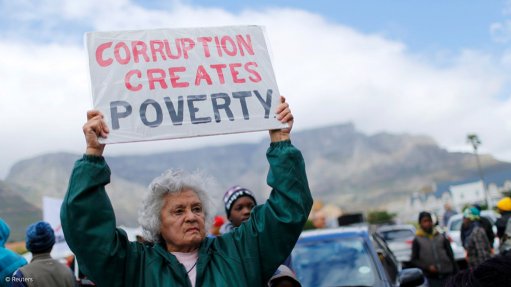Spiral of silence around GBV
Gender-based violence (GBV) is a widespread scourge, affecting more than 42% of women in East and Southern Africa during their lifetime, according to World Bank stats. Yet, it remains one of those topics that are little spoken about. There are exceptions, of course, such as in South Africa, where the 16 Days of Activism campaign against this ill plays out each year from November 25 to December 10. But the noise could be louder.
The ugly spiral of silence around GBV tends to dissipate somewhat when one person gathers the guts to speak up against it. Often, others get emboldened too, jolting the authorities into action.
Oops! I’m throwing in some communication- speak now. The spiral of silence is a mass communication theory that holds that most people have a natural – and mostly subconscious – fear of social isolation that causes them to refrain from publicly stating their views on controversial issues, of which GBV is one in many of our societies.
I thought of the spiral of silence when one Mukoma wa Ngugi posted on X and on Facebook last month that his mother had endured years of GBV at the hands of his father. Now, his father isn’t someone you wouldn’t expect to know better. He’s the great Ngugi wa Thiong’o, the Kenyan author and academic considered by many to be one of Africa’s finest literary talents.
Ngugi, currently a distinguished professor of English and comparative literature at the University of California at Irvine, in the US, is famous for works such as The River Between, Petals of Blood, Devil on the Cross, A Grain of Wheat, Weep Not, Child, Dreams in a Time of War and The Perfect Nine. Many of these gems have been, and continue to be, prescribed texts for high school and university English curricula in many countries in Africa and beyond.
To many of the 86-year-old’s fans, and respected literary critics too, it remains a mystery why he has been passed over for the Nobel Prize for Literature despite churning out a succession of highly acclaimed novels and works in other genres since bursting on to the literary scene with the publication of Weep Not, Child in 1964.
Imagine the horror evoked in the social media followers of his son when the latter posted on March 12: “My father physically abused my late mother – he would beat her up. Some of my earliest memories are [of] me going to visit her at my grandmother’s, where she would seek refuge. But with that said, it is the silencing of who she was that gets me.”
The outrage emanated from the fact that Ngugi has a decades-long reputation as an activist, starting from the 1970s, when he would call out Kenya’s founding President, Jomo Kenyatta, for displaying autocratic tendencies. In his writings, he fearlessly denounces colonialism and corruption, and he is also famous for being an advocate for African languages and literature.
To prove how the spiral of silence gets rattled when just one voice speaks out, within hours, Mukoma’s X post had amassed millions of views, thousands of reposts and just under 1 000 comments.
Among the scores who weighed in was South Africa’s Zakes Mda, who wrote: “[This is] the bravest thing any son of an icon can do.” Like Ngugi, Mda is a celebrated novelist and academic who teaches creative writing at Ohio University, in the US. Mukoma, too, is a literary giant – he has eight books under his belt and is an associate professor of English at Cornell University, also in the US.
Many media outlets also ran with the story of Ngugi’s outing as a spouse abuser.
People like Mukoma – those who dare to shine a light on GBV – should be lauded. The impact of this scourge extends far beyond victims or survivors, with implications for the productivity and wellbeing of families and communities. It also impedes women’s participation in education and in the labour market. According to the World Bank, it costs economies up to 4% of gross domestic product.
Let’s remove the spiral of silence around it once and for all.
Article Enquiry
Email Article
Save Article
Feedback
To advertise email advertising@creamermedia.co.za or click here
Comments
Press Office
Announcements
What's On
Subscribe to improve your user experience...
Option 1 (equivalent of R125 a month):
Receive a weekly copy of Creamer Media's Engineering News & Mining Weekly magazine
(print copy for those in South Africa and e-magazine for those outside of South Africa)
Receive daily email newsletters
Access to full search results
Access archive of magazine back copies
Access to Projects in Progress
Access to ONE Research Report of your choice in PDF format
Option 2 (equivalent of R375 a month):
All benefits from Option 1
PLUS
Access to Creamer Media's Research Channel Africa for ALL Research Reports, in PDF format, on various industrial and mining sectors
including Electricity; Water; Energy Transition; Hydrogen; Roads, Rail and Ports; Coal; Gold; Platinum; Battery Metals; etc.
Already a subscriber?
Forgotten your password?
Receive weekly copy of Creamer Media's Engineering News & Mining Weekly magazine (print copy for those in South Africa and e-magazine for those outside of South Africa)
➕
Recieve daily email newsletters
➕
Access to full search results
➕
Access archive of magazine back copies
➕
Access to Projects in Progress
➕
Access to ONE Research Report of your choice in PDF format
RESEARCH CHANNEL AFRICA
R4500 (equivalent of R375 a month)
SUBSCRIBEAll benefits from Option 1
➕
Access to Creamer Media's Research Channel Africa for ALL Research Reports on various industrial and mining sectors, in PDF format, including on:
Electricity
➕
Water
➕
Energy Transition
➕
Hydrogen
➕
Roads, Rail and Ports
➕
Coal
➕
Gold
➕
Platinum
➕
Battery Metals
➕
etc.
Receive all benefits from Option 1 or Option 2 delivered to numerous people at your company
➕
Multiple User names and Passwords for simultaneous log-ins
➕
Intranet integration access to all in your organisation


















